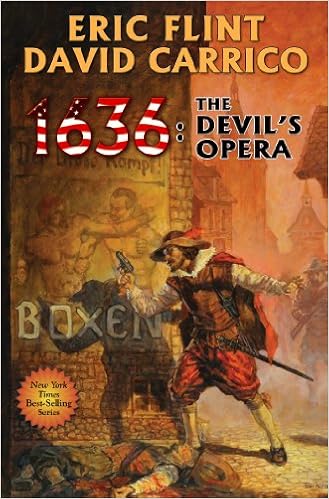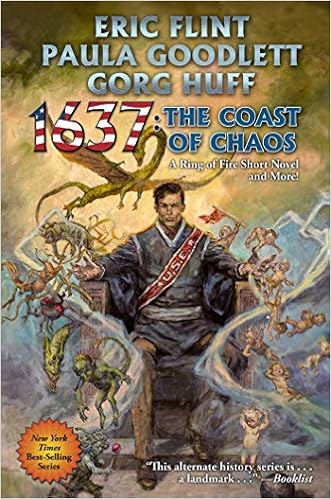
Description
From Booklist Germany, 1636. The USE—the United States of Europe—is still in its shaky birthing years. The mysterious appearance of a twenty-first-century American town (Grantville, West Virginia) in seventeenth-century Germany caused a major uproar, but an alliance with Gustavus Adolphus, the king of Sweden, allowed the displaced Americans to forge a new nation, the USE. But now, a few years later, Adolphus has been marginalized, and his successor, the stoutly antidemocratic Axel Oxenstierna, the Swedish chancellor, is hungry for power and has set his sights on the USE. Byron Chieske, the “up-time” American cop, and his “down-time” partner, Gotthilf Hoch, are concerned that some recent cases of sabotage and murder might only be the beginning of a much larger plot. This is the fourteenth book in the Ring of Fire series, and familiarity with previous stories is, if not essential, at least strongly recommended. Series fans, though, can expect to jump right in and pretty much spend the next 560 pages glued to their chairs. Another engaging alternate history from a master of the genre. --David Pitt Eric Flint was the author/creator of the multiple New York Times best-selling Ring of Fire series, starting with first novel 1632. With David Drake he wrote six popular novels in the “Belisarius” alternate Roman history series, and with David Weber, he collaborated on 1633 and 1634: The Baltic War , as well as four novels in Weber’s Honorverse series. Flint was for many years a labor union activist. David Carrico made his first professional SF sale to The Grantville Gazette e-magazine in 2004. His stories have also appeared in the Grantville Gazette and Ring of Fire anthologies from Baen Books and in Jim Baen's Universe e-magazine. Baen Books published Carrico's e-book story collection 1635: Music and Murder , as well as two novels written in collaboration with Eric Flint: 1636: The Devil's Opera and The Span of Empire , which was nominated for the 2017 Dragon Award for Best Military SF or Fantasy novel.
Features & Highlights
- A new addition to the multiple
- New York Times
- best-selling Ring of Fire series. After carving a place for itself in war-torn 17th century Europe, citizens of the modern town of Grantville, West Virginia take on a murderous conspiracy of operatic proportions in Magdeburg, the capital of the United States of Europe.
- New York Times Best Selling SeriesEric Flint
- and
- David Carrico
- serve up the latest entry in the best-selling alternate history saga of them all, the Ring of Fire! It is the year 1636. The United States of Europe, the new nation formed by an alliance between the Swedish king Gustavus Adolphus and the West Virginians hurled back in time by a cosmic accident, is on the verge of civil war. His brain injured in the war with Poland, the USE's emperor Gustavus Adolphus is no longer in command. Enter Swedish chancellor Oxenstierna, a leader of aristocratic reaction against democracy. His goal: to assemble the forces of the hidebound ruling class in Berlin and drown the revolution in a bloodbath. In Magdeburg, the capital of the USE, Mike Stearns' wife Rebecca Abrabanel is organizing popular resistance to Oxenstierna's plot. As part of the resistance, the American musician Marla Linder and her company of down-time musical partners are staging an opera that will celebrate the struggle against oppression. Princess Kristina, the heir to the USE's throne, is now residing in Magdeburg and is giving them her support and encouragement. But another plot is underway--this one right in the heart of the capital itself, and with murder as its method. The only people standing in the way are a crippled boy and the boxing champion who befriended him, and an unlikely pair of policemen. Can the American detective Byron Chieske and his down-timer partner Gotthilf Hoch thwart the killers before they succeed in their goal?
- About
- 1636: The Devil's Opera
- :
- “Another engaging alternate history from a master of the genre.”—
- Booklist
- “. . . an old-style police-procedural mystery, set in 17th century Germany. . . . the threads . . . spin together . . . to weave an addictively entertaining story. . . . a strong addition to a fun series.”—
- Daily News of Galveston County
- About Eric Flint’s Ring of Fire series:
- “This alternate history series is…a landmark…”—
- Booklist
- “[Eric] Flint's
- 1632
- universe seems to be inspiring a whole new crop of gifted alternate historians.”—
- Booklist
- “…reads like a technothriller set in the age of the Medicis…”—
- Publishers Weekly





